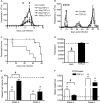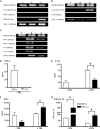Effects of exogenous transforming growth factor beta on Trypanosoma congolense infection in mice
- PMID: 17261602
- PMCID: PMC1865695
- DOI: 10.1128/IAI.01452-06
Effects of exogenous transforming growth factor beta on Trypanosoma congolense infection in mice
Abstract
The socioeconomic implications of trypanosomosis in sub-Saharan Africa and the limitations of its current control regimes have stimulated research into alternative control methods. Considering the pro- and anti-inflammatory properties of transforming growth factor beta1 (TGF-beta1) and its potential to enhance immunity against protozoan parasites, we examined the effects of intraperitoneally delivered TGF-beta1 in C57BL/6 mice infected with Trypanosoma congolense, the hemoprotozoan parasite causing nagana in cattle. A triple dose of 10 ng TGF-beta1 significantly reduced the first parasitemic peak and delayed mortality of infected mice. Furthermore, exogenous TGF-beta1 significantly decreased the development of trypanosome-induced anemia and splenomegaly. The apparent TGF-beta1-induced antitrypanosome protection, occurring mainly during the early stage of infection, correlated with an enhanced parasite antigen-specific Th1 cell response characterized by a skewed type I cytokine response and a concomitant stronger antitrypanosome immunoglobulin G2a antibody response. Infected TGF-beta1-pretreated mice exhibited a significant reduction in the trypanosome-induced hyperexpansion of B cells. Furthermore, evidence is provided herein that exogenous TGF-beta1 activates macrophages that may contribute to parasite control. Collectively, these data indicate that exogenous TGF-beta1 is immunostimulative, inducing partial protection against T. congolense infection, possibly through mechanisms involving innate immune responses.
Figures





References
-
- Bellone, G., M. Aste-Amezaga, G. Trinchieri, and U. Rodeck. 1995. Regulation of NK cell functions by TGF-β1. J. Immunol. 155:1066-1073. - PubMed
-
- Beschin, A., L. Brys, S. Magez, M. Radwanska, and P. De Baetselier. 1998. Trypanosoma brucei infection elicits nitric oxide-dependent and nitric oxide-independent suppressive mechanisms. J. Leukoc. Biol. 63:429-439. - PubMed
-
- Buza, J., and J. Naessens. 1999. Trypanosome non-specific IgM antibodies detected in serum of Trypanosoma congolense-infected cattle are polyreactive. Vet. Immunol. Immunopathol. 69:1-9. - PubMed
-
- Cummins, J. M., G. S. Krakowka, and C. G. Thompson. 2005. Systemic effects of interferons after oral administration in animals and humans. Am. J. Vet. Res. 66:164-176. - PubMed
Publication types
MeSH terms
Substances
LinkOut - more resources
Full Text Sources

